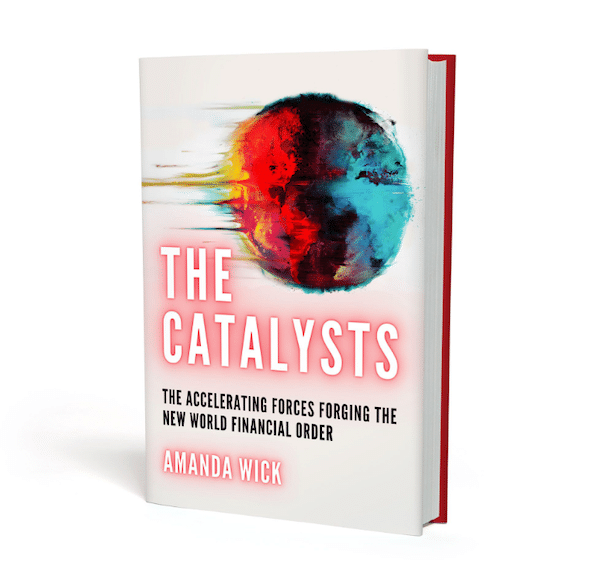Fifth Racket Title Coming
Amanda Wick's bold debut effort, The Catalysts, arrives soon.

I am pleased to announce the next Racket title.
The Catalysts: The Accelerating Forces Forging the New World Financial Order by Amanda Wick will arrive around early 2025. As its title suggests, it's an ambitious text that examines a wide range of global changes and how policymakers, wonks, regulators, and elected officials can successfully navigate them.
Here's the cover:

The book will be available in four versions:
- Hardcover
- Paperback
- eBook
- Audiobook
Synposis
Since the end of WWII, the United States has dominated the global economic stage. Not coincidentally, the US dollar has served as the world’s default currency. America has routinely rattled its saber to wage and win wars, cripple economies, leverage its soft power, and nudge its allies. Enemies who have dared to bear the brunt of America’s stifling economic sanctions have suffered the consequences.
For a bevy of reasons, however, America’s global financial reign is rapidly coming to a close. It’s not a question of if, but when. No dynasty lasts forever, and the US is proving to be no exception to this rule.
Blame—or thank, depending on your point of view—a diverse set of powerful catalysts. They include American political dysfunction, the invention of cryptocurrencies and decentralized finance, the rise of tribalism, and others. Any one of these forces alone would challenge the mightiest of empires. Their combination, however, is accelerating the birth of a new financial world order.
But what will this new, uncertain financial system look like? What are the rules? Where are the minefields and opportunities? Moreover, how can a nation, its elected officials, a non-governmental organization, or a think tank navigate this often chaotic milieu? Policymakers’ and advisors’ answers to these existential questions are wanting.
Amanda Wick has seen these forces play out firsthand, both domestically and internationally. As a Senior Investigative Counsel for the US House of Representatives and a staff member of the January 6th Committee, she witnessed how a once-great nation attempted to whitewash an insurrection. On the global stage, she has advised organizations of all sorts and spoken frequently about the rise of cryptocurrency, web3, and blockchain technology.
Wick’s debut book—The Catalysts: The Accelerating Forces Forging the New Financial World Order—could not have arrived at a more opportune moment. Insightful, timely, and essential, The Catalysts clearly explains what’s really happening, why, and what policy professionals can do to best position their constituents for the vastly different world ahead.
